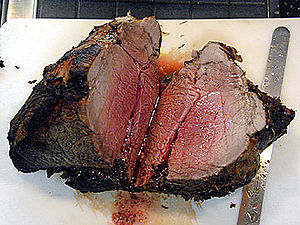This one is for all of the carnivores out there:
This one is for all of the carnivores out there:
Eating even a half-serving more of red meat over time is associated with an increased risk of type-2 diabetes mellitus (T2DM) in a follow-up of three studies of about 149,000 U.S. men and women, according to a report published Online First by JAMA Internal Medicine.
While previous studies have related red meat consumption to greater risk of T2 diabetes, they only measured consumption at baseline — a single point in time. There has been limited follow up of longer-term eating behaviors, according to a press release from JAMA.
An Pan, Ph.D., of the National University of Singapore, and colleagues analyzed data from three Harvard group studies and followed up 26,357 men in the Health Professionals Follow-up Study; 48,709 women in the Nurses’ Health Study; and 74,077 women in the Nurses’ Health Study II. Diets were assessed using food frequency questionnaires.
During more than 1.9 million person-years of follow-up, researchers documented 7,540 incident cases of T2DM.
“Increasing red meat intake during a four-year interval was associated with an elevated risk of T2DM during the subsequent four years in each cohort,” according to the study.
The results indicate that compared with a group with no change in red meat intake, increasing red meat intake of more than 0.50 servings per day was associated with a 48 percent elevated risk in the subsequent four-year period. Reducing red meat consumption by more than 0.50 servings per day from baseline to the first four years of follow-up was associated with a 14 percent lower risk during the subsequent entire follow-up.
The authors noted the study is observational so causality cannot be inferred.
“Our results confirm the robustness of the association between red meat and T2DM and add further evidence that limiting red meat consumption over time confers benefits for T2DM prevention,” the authors concluded.
Something to consider before ordering your next Big Mac.







_8-250x220.jpg)

